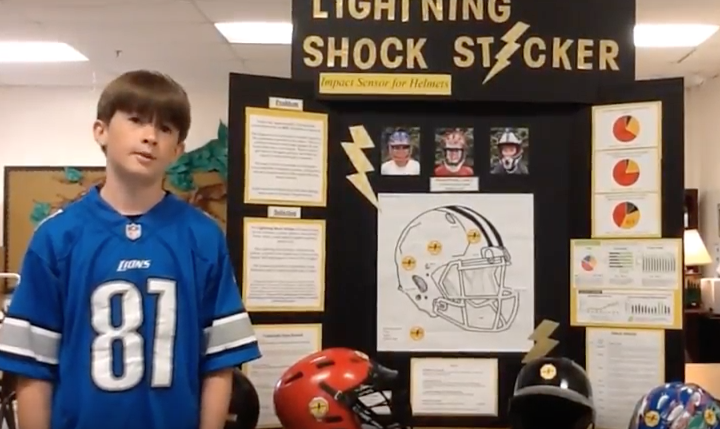
Winners from the K-12 InVenture Prize at Georgia Tech held in March compete and place at the National Invention Convention and Entrepreneurship Expo.
The 2018 National Invention Convention and Entrepreneurship Expo (NICEE), presented by United Technologies Corporation®, was held May 31 – June 2, 2018, at the Henry Ford Museum in Dearborn, Michigan. Winners from the K-12 InVenture Prize competition held at Georgia Tech earlier this year went on to compete at a national level at NICEE. The event provides an opportunity for young inventors and entrepreneurs in grades 3-12.
The Lightning Shock Sticker
Michael Muldoon is a 5th-grade student at Mount Bethel Elementary School in Marietta, Georgia. The need for a simple and inexpensive method of detecting an impact that may cause a concussion was brought to Michael’s attention after a friend was diagnosed with a concussion days after a blow to the head during a lacrosse match.
The “Lightning Shock Sticker” can be placed directly on the exterior of any sports helmet in the areas where an impact is most likely. If a player receives a hit to the head that has a g-force rating of roughly 95 g’s, the sticker will turn red, alerting the coach and player to the need for possible medical attention.
Michael was awarded 3rd place in the 5th-grade level category and the Sports, Games, Entertainment and Toys Award, presented by Chevron®. Michael said, "The convention was an experience I will never forget.”
Water Heater Sensor
The anode rod is a standard component of a water heater that protects the metal tank from corrosion. The rod slowly erodes over time and needs regular replacement to avoid water leaks from a rusted-out tank.
The “Water Heater Sensor” was developed by Sophia Hernandez, Ariana Islam, and Sarayu Reddy, 7th-grade students at the Fulton Science Academy in Alpharetta, Georgia. The device replaces the original anode rod with one that has a water sensor embedded near the section where the eroded rod reaches a length that requires replacement. The sensor is triggered once it is exposed to water due to corrosion, alerting the homeowner to replace the anode rod.
“NICEE was a great experience because we were able to interact with other inventors,” said Sophia. “It was a big eye-opener, and I will definitely do it again next year.”
The team of inventors was awarded the Home Technology, Smart Homes, Appliances Award, presented by Carrier®, the CAD Award, presented by Autodesk®, and the Patent Application Award, presented by WilmerHale®.
Automatic Magnivision
Many professions such as jewelers and surgeons perform precise tasks that require a magnifying visor for viewing small things. This is also true of hobbyists like Marc Van Zyl’s father who struggles to lower his magnifying glass visor into place while maintaining contact with the object he’s working on.
Marc, a 7th-grade student at JC Booth Middle School in Peachtree City, Georgia, invented a magnifying visor called “Automatic Magnivision” that is attached to a baseball cap that allows the user to lower the magnifying visor into place hands-free with a simple nod of the head. The system uses motion sensors and servo motors to position the visor into place. Marc was presented with the Technologies/Wearables Award by THE STEMIE Coalition.
Marc said, “What I loved most about the InVenture Prize was that everyone I met was interested in my invention and had amazing ideas of how to improve my product and what I could do next.” He went on to say, “I really loved being given the opportunity to go to NICEE and meet other students with amazing ideas from all over the country.”
KAT RAMM
The Kinesthetic Approach to Retraining Memory Muscle (KAT RAMM) was created by Isabella Parker, a 9th-grade student at Harrison High School in Powder Springs, Georgia. The 3-D printed device would aid in the rehabilitation of writing and communications motor skills in stroke victims and others with disabilities. Patients develop better coordination by tracing cut out words placed under the KAT RAMM while holding an attached tennis ball that improves the user's grip on the tracing device. Isabella was awarded the Accessibility Award, presented by 3Doodler®.
Hydraptor
Noah Bruckner, Rishab Rao, and Alexandra Holdmeyer discovered a need for firefighters to be able to quickly connect a water hose to a fire hydrant to save time in situations where seconds count. Currently, firefighters need to rotate the hose connection many times to screw the hose into place. With the “Hydraptor” the connection can be made in seconds with a single turn and push.
The 10th-grade students from Walton High School in Marietta, Georgia envision a smaller version of the adaptor that can be used on a garden hose by consumers. The team’s teacher, Ann Baxley said, “The great success of the students from Georgia at Nationals is largely due to the quality of the Georgia Tech K-12 InVenture Prize program and its support to teachers and students.” The team received the Best Engineering Award, presented by Maxim Integrated®.
The Director of the K-12 InVenture Prize at Georgia Tech, Roxanne Moore, expressed her pride for the student competitors from Georgia by saying, “The K-12 students and teachers in Georgia always seem to rise to the occasion when you put them on a national stage, and this year was no exception. With innovative, driven students like these, our future is in great hands.”
By Steven L. Taylor - CEISMC Communications